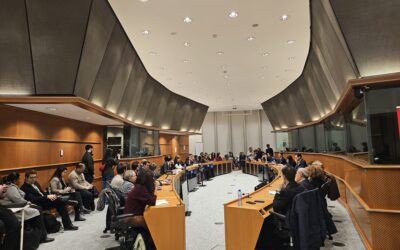Donald Trump’s return to the White House has not only caused a political stir, but also raises serious concerns in relation to the environment. The withdrawal of the United States from the Paris Agreements, which already took place in his first term, is a clear sign of disinterest in the climate emergency. But what, really, will be the environmental impact of his new presidency?
A return to fossil fuels: the beginning of an era of wild drilling
With his inauguration in January 2025, Trump has taken over the reins of a policy that points decisively towards an explosive expansion of fossil extraction. The famous slogan ‘Drill, baby, drill! ’ is not a thing of the past, but the basis of a new era: unrestrained drilling, both on the continent and at sea, and the removal of all constraints on the oil and gas industry. During his first term, the US became the world’s leading oil producer, and now this trend is expected to accelerate. The decision to renounce international commitments, such as reducing greenhouse gas emissions, and to abandon the Green New Deal makes his presidency a real threat to global efforts against climate change.
The halt to international agreements
One of the most significant impacts of the new Trump administration will be the final US withdrawal from the Paris Agreement. This step, which had already caused concern around the world in 2017, jeopardises global climate warming containment goals, even those of +2°C, compared to pre-industrial levels. Indeed, the US is one of the largest emitters of greenhouse gases globally. The US disengagement only aggravates the already difficult situation by reducing the momentum towards the implementation of ambitious climate policies.
The brake on green innovation
In addition to undermining international agreements, Trump undermines technological innovation in the energy sphere, curbing the expansion of renewable energy and the shift towards electric mobility. His administration favours fossil fuels, not only at home, but also abroad through the export of gas and coal, with heavy repercussions on the global energy market. This policy, if left unchecked, not only undermines sustainability goals, but also encourages higher energy costs and the use of polluting sources.
The risk to the environment and health
Trump’s choices, geared towards an expansion of fossil energy production and further deregulation, pose serious risks not only to the climate, but also to public health. Air pollution from coal, oil and gas extraction and combustion has devastating impacts on local ecosystems and communities, particularly in the most vulnerable regions. Moreover, global warming is already showing its effects with increasingly frequent extreme events, such as wildfires, hurricanes and droughts, threatening the safety and prosperity of people, both in the United States and globally.
Bottom-up change and multilateralism as hope for the planet
US federal disengagement assigns the grounds for hope for an ecological future to theaction of civil society, business and local governments. What is needed is a ‘disobedience from below’ that maintains previously signed climate mitigation targets. Although Trump has shown scepticism towards multilateral agreements, multilateralism remains crucial in the fight against climate change. Countries such as Europe and China, despite political difficulties, continue to pursue the energy transition. International cooperation, through climate finance and the creation of green markets, is essential to reduce damage and promote global ecological solutions.




